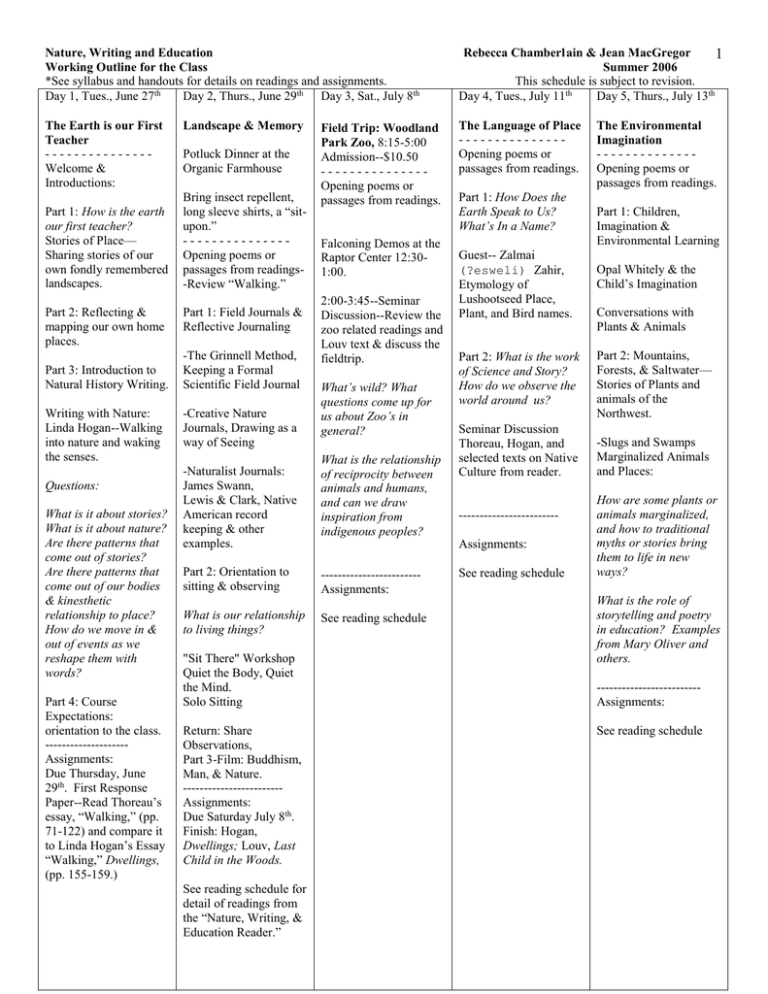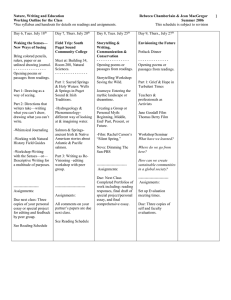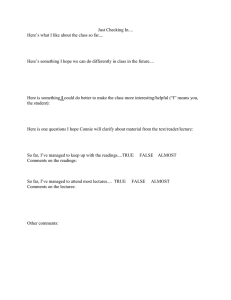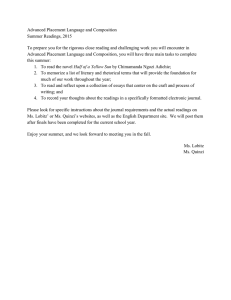1
advertisement

Nature, Writing and Education Working Outline for the Class *See syllabus and handouts for details on readings and assignments. Day 1, Tues., June 27th Day 2, Thurs., June 29th Day 3, Sat., July 8th Rebecca Chamberlain & Jean MacGregor 1 Summer 2006 This schedule is subject to revision. Day 4, Tues., July 11th Day 5, Thurs., July 13th The Earth is our First Teacher --------------Welcome & Introductions: The Language of Place --------------Opening poems or passages from readings. Part 1: How is the earth our first teacher? Stories of Place— Sharing stories of our own fondly remembered landscapes. Part 2: Reflecting & mapping our own home places. Part 3: Introduction to Natural History Writing. Writing with Nature: Linda Hogan--Walking into nature and waking the senses. Questions: What is it about stories? What is it about nature? Are there patterns that come out of stories? Are there patterns that come out of our bodies & kinesthetic relationship to place? How do we move in & out of events as we reshape them with words? Part 4: Course Expectations: orientation to the class. -------------------Assignments: Due Thursday, June 29th. First Response Paper--Read Thoreau’s essay, “Walking,” (pp. 71-122) and compare it to Linda Hogan’s Essay “Walking,” Dwellings, (pp. 155-159.) Landscape & Memory Potluck Dinner at the Organic Farmhouse Bring insect repellent, long sleeve shirts, a “situpon.” --------------Opening poems or passages from readings-Review “Walking.” Part 1: Field Journals & Reflective Journaling -The Grinnell Method, Keeping a Formal Scientific Field Journal -Creative Nature Journals, Drawing as a way of Seeing -Naturalist Journals: James Swann, Lewis & Clark, Native American record keeping & other examples. Part 2: Orientation to sitting & observing What is our relationship to living things? "Sit There" Workshop Quiet the Body, Quiet the Mind. Solo Sitting Return: Share Observations, Part 3-Film: Buddhism, Man, & Nature. -----------------------Assignments: Due Saturday July 8th. Finish: Hogan, Dwellings; Louv, Last Child in the Woods. See reading schedule for detail of readings from the “Nature, Writing, & Education Reader.” Field Trip: Woodland Park Zoo, 8:15-5:00 Admission--$10.50 --------------Opening poems or passages from readings. Falconing Demos at the Raptor Center 12:301:00. 2:00-3:45--Seminar Discussion--Review the zoo related readings and Louv text & discuss the fieldtrip. What’s wild? What questions come up for us about Zoo’s in general? What is the relationship of reciprocity between animals and humans, and can we draw inspiration from indigenous peoples? -----------------------Assignments: See reading schedule Part 1: How Does the Earth Speak to Us? What’s In a Name? Guest-- Zalmai (?esweli) Zahir, Etymology of Lushootseed Place, Plant, and Bird names. Part 2: What is the work of Science and Story? How do we observe the world around us? Seminar Discussion Thoreau, Hogan, and selected texts on Native Culture from reader. -----------------------Assignments: See reading schedule The Environmental Imagination -------------Opening poems or passages from readings. Part 1: Children, Imagination & Environmental Learning Opal Whitely & the Child’s Imagination Conversations with Plants & Animals Part 2: Mountains, Forests, & Saltwater— Stories of Plants and animals of the Northwest. -Slugs and Swamps Marginalized Animals and Places: How are some plants or animals marginalized, and how to traditional myths or stories bring them to life in new ways? What is the role of storytelling and poetry in education? Examples from Mary Oliver and others. ------------------------Assignments: See reading schedule Nature, Writing and Education Working Outline for the Class *See syllabus and handouts for details on readings and assignments. Rebecca Chamberlain & Jean MacGregor Summer 2006 This schedule is subject to revision. 2




